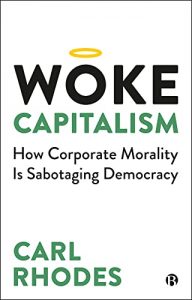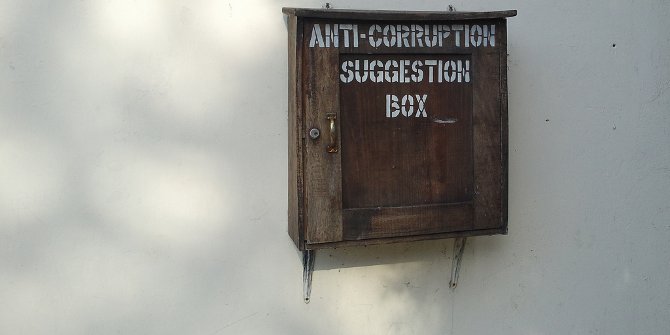In Woke Capitalism: How Corporate Morality is Sabotaging Democracy, Carl Rhodes explores how the corporate world’s calculated embrace of social justice poses a significant societal threat. This book not only unveils the hypocrisies and self-serving nature of ‘woke capitalism’, but also its pernicious effect on democracy, finds Andrew McCracken.
Woke Capitalism: How Corporate Morality is Sabotaging Democracy. Carl Rhodes. Bristol University Press. 2021.
 In the 2016 NFL season, Colin Kaepernick – a quarterback playing for the San Francisco 49ers – took a stand by not standing. Kaepernick chose to sit down, later opting to take a knee, during the traditional playing of the US national anthem before each game, in a protest against racial injustice.
In the 2016 NFL season, Colin Kaepernick – a quarterback playing for the San Francisco 49ers – took a stand by not standing. Kaepernick chose to sit down, later opting to take a knee, during the traditional playing of the US national anthem before each game, in a protest against racial injustice.
This silent protest struck a nerve at a time when much of the world was fixated on the lurid presidential campaign of Donald Trump and his open flirtation with white nationalism. While lauded by many on the left, Kaepernick was accused of disrespecting the US and its troops and was verbally abused at games. He was described by a prominent African American analyst as not being truly ‘black’ (Kaepernick is biracial and was adopted by white parents), while Trump himself suggested that Kaepernick ‘should find a country that works better for him’. The protest also cost Kaepernick his career; after the conclusion of the 2016 season, his contract with the 49ers was terminated and no other NFL team moved to sign him.
Jettisoned by his sport, Kaepernick was given a new platform. He became the central figure in Nike’s ‘Dream Crazy’ advertising campaign, which launched in September 2018 with the slogan: ‘Believe in something. Even if it means sacrificing everything.’ Building a major marketing campaign around such a divisive figure seemed to represent a significant risk for Nike. Initial reaction suggested that the firm had miscalculated: hysterical sportswear fans upset at the endorsement burned the company’s products, Nike’s share price dipped and Trump – now president – claimed the ad was sending ‘a terrible message’. But Nike knew what it was doing. The company’s stock price rallied after it reported a significant sales boost, while the campaign itself won an Emmy.
Two years later, The New York Times reported that Nike was one of several companies lobbying to dilute US government measures targeting forced labour in Xinjiang, the region in China that produces 20 per cent of the world’s cotton. On social media, the New York Times story was mockingly posted alongside Nike’s slogan: ‘Believe in something. Even if it means sacrificing everything.’
Nike is far from the only global brand whose attempts to co-opt ‘woke’ causes have left it open to allegations of hypocrisy, but does the corporate world’s calculated embrace of social justice pose a more significant societal threat? In his engaging book, Woke Capitalism: How Corporate Morality is Sabotaging Democracy, Carl Rhodes – a professor at the University of Technology Sydney – argues that it does.

Image Credit: Pixabay CCO
Rhodes traces ‘woke capitalism’ back to the corporate social responsibility movement that emerged in America in the mid-twentieth century. In 1953, the American economist Howard Bowen argued that business leaders should acknowledge that their activities affect not only their shareholders, employees and customers, but also society at large. For Rhodes, woke capitalism represents a bloated form of the corporate social responsibility outlined by Bowen, with many companies today seeking to act – and be seen to act – in a socially responsible manner in arenas that have no relation to their business.
Conservative critics of woke capitalism have argued that extending corporate responsibility beyond the interests of shareholders is a betrayal of capitalist principle. As Milton Friedman asserted: ‘There is only one social responsibility of business – to use its resources and engage in activities designed to increase its profits so long as it stays within the rules of the game.’
For Rhodes, this critique of woke capitalism represents a fundamental misunderstanding of the movement. Woke capitalists are not seeking to upend or redirect the capitalist system; they are working to protect it. In the 1950s Bowen argued that attempts by government to regulate business ‘might jeopardise our essential freedoms and curtail the spirit of enterprise’. Rhodes highlights this comment as betraying the reality that corporate responsibility was always ‘a defensive tactic to ward off what was seen as a real threat of socialism’. Today, many of the most prominent advocates of woke capitalism claim that popular anger at the malign impacts of big business poses an existential threat that must be headed off. Woke capitalism, like its predecessor corporate social responsibility, is ‘about ensuring that capitalism, and the inequalities it produces, can survive without popular revolt’.
The self-interest at the heart of woke capitalism is revealed by corporations’ approach to taxation. Noting that paying tax ‘is the corporate social responsibility’, Rhodes highlights the contradictions of corporations supporting leftist causes such as LGBTQ rights and Black Lives Matter, while simultaneously engaging in ‘aggressive tax avoidance’. Companies are depriving countries around the world of billions of dollars of tax revenue that could be invested in government welfare programmes, while casting themselves as heroes in the fight for social justice.
As his book’s subtitle suggests, Rhodes is concerned not just with the hypocrisies and self-serving nature of woke capitalism, but also its pernicious effect on democracy. BlackRock CEO Larry Fink has stated that, as governments fail to deal with the major challenges now facing the world, the public ‘are pushing companies’ to step in where politicians have failed. Woke Capitalism labels these arguments a ‘hostile takeover’ of the democratic system.
Corporate philanthropy is also singled out as a potential threat to democracy. In 2020, Amazon founder Jeff Bezos committed $10 billion to the Bezos Earth Fund, an organisation tasked with limiting and combating the effects of climate change. The obscene wealth of Bezos – at the time of writing, Forbes places his net worth at $171 billion – is attributable in part to Amazon’s well-documented exploitation of tax loopholes. Rhodes is rightly critical of a system that enables corporations and individuals to deprive democratically elected governments of the funds to pursue their political goals. This system empowers the same businesspeople to ‘determine the future of the world’s citizens’ by channelling their wealth into projects chosen in accordance with their ‘personal whims and predispositions’.
Notwithstanding his distaste for woke capitalism, Rhodes is not anti-woke. ‘Woke’ social justice campaigns are discussed admiringly throughout the book, while critics of these movements are brusquely dismissed as right-wing cranks. Parts of Woke Capitalism suggest that Rhodes possesses an old-fashioned leftist sensibility, with his calls to raise taxes on big business, overthrow corporate behemoths and undo the neoliberal consensus. He concludes with a call to ‘be woke to woke capitalism’ and the inequities of the system it seeks to uphold. It remains to be seen whether any political parties of the left will offer a vision that can deliver these reforms.
- This review first appeared at LSE Review of Books.
Please read our comments policy before commenting.
Note: This article gives the views of the author, and not the position of USAPP – American Politics and Policy, nor of the London School of Economics.
Shortened URL for this post: https://bit.ly/3vq0K7E
About the reviewer
Andrew McCracken – ESG
Andrew McCracken is a director of the ESG and human rights practice at a global consulting firm. He holds an MSC in the Theory and History of International Relations from the LSE.






